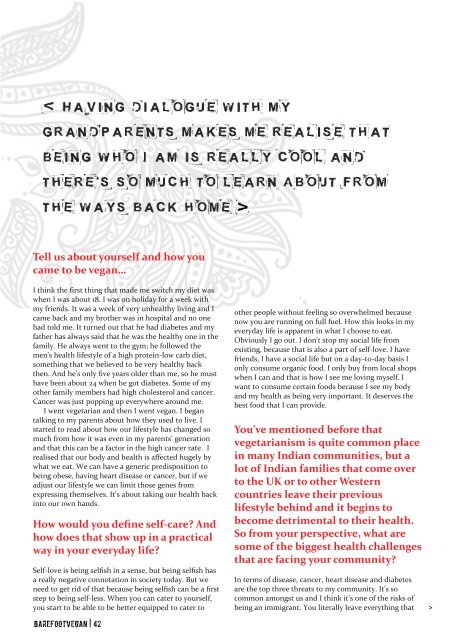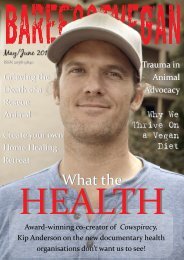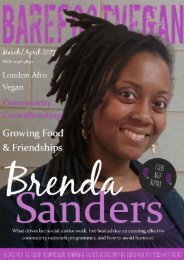Barefoot Vegan Mag Jan_Feb 2017
You also want an ePaper? Increase the reach of your titles
YUMPU automatically turns print PDFs into web optimized ePapers that Google loves.
Tell us about yourself and how you<br />
came to be vegan…<br />
I think the first thing that made me switch my diet was<br />
when I was about 18. I was on holiday for a week with<br />
my friends. It was a week of very unhealthy living and I<br />
came back and my brother was in hospital and no one<br />
had told me. It turned out that he had diabetes and my<br />
father has always said that he was the healthy one in the<br />
family. He always went to the gym; he followed the<br />
men's health lifestyle of a high protein-low carb diet,<br />
something that we believed to be very healthy back<br />
then. And he's only five years older than me, so he must<br />
have been about 24 when he got diabetes. Some of my<br />
other family members had high cholesterol and cancer.<br />
Cancer was just popping up everywhere around me.<br />
I went vegetarian and then I went vegan. I began<br />
talking to my parents about how they used to live. I<br />
started to read about how our lifestyle has changed so<br />
much from how it was even in my parents’ generation<br />
and that this can be a factor in the high cancer rate. I<br />
realised that our body and health is affected hugely by<br />
what we eat. We can have a generic predisposition to<br />
being obese, having heart disease or cancer, but if we<br />
adjust our lifestyle we can limit those genes from<br />
expressing themselves. It's about taking our health back<br />
into our own hands.<br />
How would you define self-care? And<br />
how does that show up in a practical<br />
way in your everyday life?<br />
Self-love is being selfish in a sense, but being selfish has<br />
a really negative connotation in society today. But we<br />
need to get rid of that because being selfish can be a first<br />
step to being self-less. When you can cater to yourself,<br />
you start to be able to be better equipped to cater to<br />
other people without feeling so overwhelmed because<br />
now you are running on full fuel. How this looks in my<br />
everyday life is apparent in what I choose to eat.<br />
Obviously I go out. I don't stop my social life from<br />
existing, because that is also a part of self-love. I have<br />
friends, I have a social life but on a day-to-day basis I<br />
only consume organic food. I only buy from local shops<br />
when I can and that is how I see me loving myself. I<br />
want to consume certain foods because I see my body<br />
and my health as being very important. It deserves the<br />
best food that I can provide.<br />
You’ve mentioned before that<br />
vegetarianism is quite common place<br />
in many Indian communities, but a<br />
lot of Indian families that come over<br />
to the UK or to other Western<br />
countries leave their previous<br />
lifestyle behind and it begins to<br />
become detrimental to their health.<br />
So from your perspective, what are<br />
some of the biggest health challenges<br />
that are facing your community?<br />
In terms of disease, cancer, heart disease and diabetes<br />
are the top three threats to my community. It's so<br />
common amongst us and I think it’s one of the risks of<br />
being an immigrant. You literally leave everything that ><br />
BAREFOOT<strong>Vegan</strong> | 42





